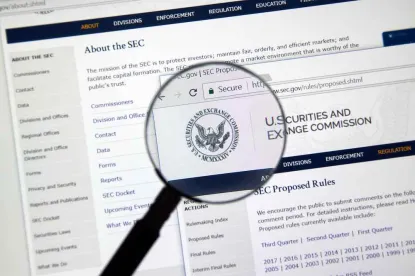The Securities and Exchange Commission’s Office of Compliance Inspections and Examinations (“OCIE”) highlighted alternative data, or “alt data,” as a top examination priority.1 AIMA held a webinar on November 17, 2020, for investment managers on OCIE’s use of alt data, entitled Alternative Data and OCIE: How, What and Why You Should Prepare Ahead of Your Next SEC Exam, led by Senior Advisor of Promontory Financial Group Jane Jarcho, Director of Promontory Financial Group Sarah Curran, Director of Promontory Financial Group Drew Weilbacher, as well as AIMA’s Senior Advisor, Suzan Rose.
1. Scrutinize Your Information Sources
The first takeaway is to scrutinize your information sources to identify your use of alt data providers, in particular, and how that data fits into the firm’s policies and procedures in relation to material nonpublic information (“MNPI”) or personally identifiable information (“PII”). Here are some considerations:
-
Beware of how you are acquiring data: manually or with software, through “data scraping,” “web scraping,” “data mining,” and similar practices on websites, and consider allocation of potential liability for domestic and international issues, including breaches of contract, terms of use violations, IP infringement, and other prospective issues that might arise.
-
The general threshold for examining whether alt data might be information that constitutes MNPI would be when the investing public would not ordinarily have access to the data and the data could be expected to affect a reasonable investor’s decision-making.
-
Similarly, determine whether there is any personally identifiable information (PII), that you may acquire, and be sure not to run afoul of any privacy rules or regulations controlling its uses.
2. Revise Your Policies and Procedures to Ensure Compliance
The second takeaway is to implement, revise, and revisit your policies and procedures for handling data. Here are some considerations:
-
Focus on the reasonableness of policies and procedures on data handling, including whether they are practically structured and written.
-
Policies and procedures should address aspects of pulling, storing, and transmitting data securely.
-
Structure compliance policies and procedures reasonably designed to meet Section 204A of the Investment Advisers Act of 1940 (the “Advisers Act”).
3. Conduct a Risk-Benefit Analysis for Your Data Vendors
The third takeaway is that vendors can provide excellent data for your investment fund, but the problems associated with dealing with certain vendors may outweigh their value to your investment fund. Here are some considerations:
-
Due diligence is a process, not an event. Prepare and routinely update standard questionnaires for vendors, focusing on: (i) past, current, or threatened litigation the vendor faced, is facing, or may face; (ii) legal violations, enforcement actions, suspended licenses, cease-and-desist letters, and similar issues, whether past, current, or threatened, involving the vendor; and (iii) how the vendor locates, extracts, handles, and transmits data, including whether and how it deals with MNPI and PII.
-
Implement internal ongoing monitoring protocols and “red flag” systems to note any issues involving vendors working for you.
-
Vendors should be held to periodic check-ins, where responses to questionnaires and/or representations made about risk areas and red flags are revisited and rechecked with a reasonable degree of regularity.
4. Perform Employee Training on Data Handling
The fourth takeaway is that employees should be trained on handling data. Here are some considerations:
-
Employees of investment firms or funds need to be trained thoroughly during the onboarding process.
-
Also, employees’ familiarity and compliance with data-handling policies and protocols should be monitored and supplemented regularly.
-
Training must go beyond mere familiarity with terminology and prospective risks involving alt data, MNPI, PII, etc. Employees need to know how to identify such information, including spotting MNPI within alt data sets, and what to do when they find MNPI.
5. Maintain Ongoing Monitoring of All Compliance Points
The fifth takeaway is that ongoing monitoring affects every aspect of compliance. Here are some considerations:
-
What is currently adequate for written policies and procedures for handling alt data, MNPI, etc., can change in material ways with relative speed, and such policies and procedures (including questionnaires for vendors) need to be revisited and revised regularly.
--------------------------------------------------------
1 Note: “Alt data” refers to data not traditionally in investors’ data sources that investors use to gain insights into a company or investment. OCIE Exam 2020 Exam Priorities: https://www.sec.gov/news/press-release/2020-4








 />i
/>i

